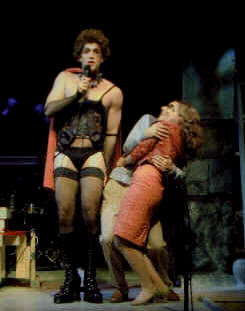I believe American politics for the last forty years has been entirely about a battle between the 1950s (conservatism) and the 1960s (liberalism). Although this last election might be the end of it -- McCain (the 50s) lost so decisively to Obama (the 60s) -- and since Obama is our first President who wasn't involved in any way in Vietnam or the Civil Rights Movement, and since the folks who remember the 50s are becoming fewer and fewer, this battle may soon be over. But what a fucking battle it's been!
 And of course, musical theatre has dissected and commented upon this battle like other art forms have. It was obviously at the center of Hair.
And of course, musical theatre has dissected and commented upon this battle like other art forms have. It was obviously at the center of Hair. But The Rocky Horror Show is about this battle too, with Brad as the straight-laced 1950s, Janet as the sexually adventurous 1960s, and Frank N. Furter as the Sexual Revolution itself, for both better and worse. But in Rocky everybody loses.
Grease is also about this, with Danny as the 60s, and Sandy/Sandra Dee as the 50s. And at the end of the show, Sandy crosses over to the 60s with a defiant (and literal) "Fuck it!"
Last night I caught Animal House on cable, a movie I truly believe is a masterpiece of social satire. And Animal House, set in 1962, is about this epic battle too -- the whole movie is a battle between the forces of chaos (the 60s) versus the forces of order (the 50s), and the 60s win, literally tearing down the 50s at the end.
Charlie Starkweather was right at the heart of all this in 1958 -- he represented everything adults feared about the coming 1960s: rock and roll, teen sex, teen movies, fast cars, "juvenile delinquents," in fact, all of teen culture. To some extent, though less explicitly, Love Kills is also sort of about this big cultural battle, with Charlie and Caril representing the chaos and anarchy of the coming 1960s, and Merle and Gertrude as defenders of what's right and decent and worthy of Eisenhower's (smothering but superficially ordered) 1950s.
I don't know if that 50s vs. 60s thing is as key to 20th century America as I think it is, or if it's just because I came out of the 60s and want to understand those churning cultural forces that birthed me. I realize now, looking back on my childhood in the 60s and 70s, that even within my own family there was that battle between these two visions of America.
Charlie and Caril were the real-life demons that terrified adults in 50s movies like The Wild Ones and Rebel Without a Cause. But why is that terror still with us? Why are the conservatives so terrified of nonprofit healthcare? Why are they so terrified of hip-hop culture? Why do they still fetishize the "Other," first the Communists, then the Blacks, then the hippies, then the rappers, then the Mexicans, now "the terrorists" (which to them often means all Arab men)...?
We have another piece of the puzzle here, but the picture still isn't decipherable. Maybe it never will be. Maybe it's just too complicated... But it sure is interesting!
Long Live the Musical!
Scott






0 comments:
Post a Comment